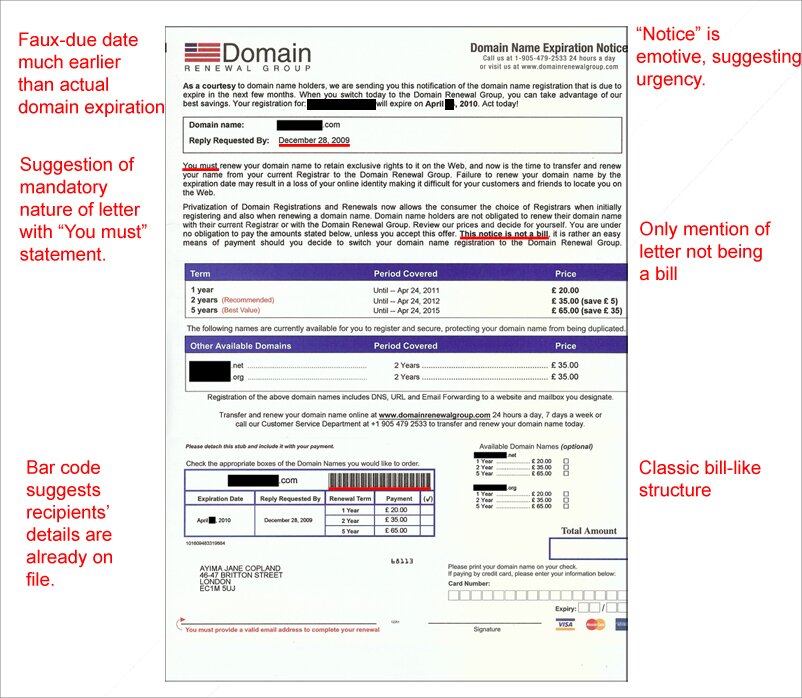Domain Renewal Group. Yuck.
2009

Here’s one about ethics in marketing and advertising, and I am not, for once, talking about buying links. Advertising is, to a large degree, an exercise is fooling people into handing over their money. This morning, however, I was presented with a form of marketing that, to my mind, crosses the lines of acceptability.
The post arrived. I was handed a letter and plain white envelope. It was, on first glance, a bill. The point, however, is that it wasn’t.
These notices are relatively common, although we ignore them to the detrminent of online marketing’s standards and reputation. They try quite hard to make it seem as though one needs to pay in order to keep one’s property. The text states in bold that the letter is not a bill (and I didn’t even need to get past the first couple of glances to know what was going on), as is shown in the image below. However, without my highlighting (and due to other features of the letter, which I’ll also cover), that one statement hardly stands out. Additionally, it arrived in the post. We’re far more accustomed to ignoring emails than to ignoring official-looking mailed documents.
These notices certainly try their best to look like a bill, read like a bill and barely highlight the fact that they aren’t. From a company called Domain Renewal Group (), the letter explains that “in the next few months”, a domain the recipient owns is set to expire. As it turns out, the domain referenced in my letter does not expire until late April, 2010, but the date on the letter that catches the eye is December 28th of this year. The goal of the letter is to have a person transfer registration to Domain Renewal Group from their current registrar. The fine print makes clear that the move is not mandatory, but the layout and tone of the letter is quite obviously deliberately structured to scream “invoice!”
 Click the image for a full-sized version
Click the image for a full-sized version
To my mind, this sort of marketing seeks to exploit a couple of things. Firstly, a lot of people tend to operate in a state between busy and lazy. Especially if a person is used to receiving scores of notices, bills, invoices and receipts, they can become lazy about the fine print. Secondly, the vast majority of people do not “get” Internet. I dare say over half the people reading this don’t know how domain registration works, and most of you are probably geekier than average. A large number of people will, at least on initial inspection, assume that this is something they need to do in order to keep their website.
Ignorance, laziness and the need to move onto other tasks combines: “This note says we need to pay £20.00 by December 28 to keep that domain? Stick it on the card we use for incidentals.” People’s natural reaction upon receiving an invoice tends to be to jump to the bottom, where the numbers are, to figure out what they owe. Again, only once does the notice state that it isn’t a bill, and it doesn’t state this in a noticeable manner.
I estimate that a huge portion of the Domain Renewal Group’s sales are borne of this partnership of misunderstanding and hurried bill-paying. For a couple of times more money than is necessary to renew a domain name in most cases, people transfer their registration to this company.
Question time: Does this go too far? I say it does, but I work in the online marketing community and I would guess that some of you will disagree. “It’s in the fine print; hell, the print ain’t even that fine. In neatly printed Arial, it says ‘This notice is not a bill’. If you fall for this, it’s your own fault.”
Indeed, the practice isn’t illegal. It is, however, a disgusting way to advertise and it isn’t exclusive to domain registrars. Make it seem like a potential customer owes you money (and that they’ll lose something important to them if they don’t pay). Classy stuff, Domain Renewal Group. I can only hope everyone takes your name to Google before parting with their cash.
via on Flickr



Comment